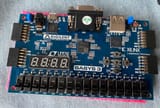Anonymous
8/15/2025, 8:35:41 PM
No.106272590
>>106272599
>>106272625
>>106272805
>>106275100
>>106276258
>>106276753
>>106276790
>>106276826
>>106277046
>>106277055
>>106277151
>>106277444
>>106277752
>>106277809
>>106277819
>>106277857
>>106277911
>>106277955
>>106278827
explain FPGAs to a retard
file.png
md5: e65e0eb9... 🔍

i dont understand FPGAs.
from what i read they're like a CPU except that they're "programmable", but what the fuck does that mean? what's there even to program?
from what i read they're like a CPU except that they're "programmable", but what the fuck does that mean? what's there even to program?
